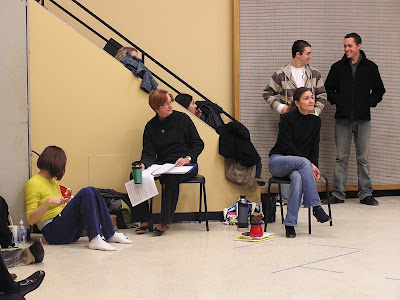
bring a pencil
Introduction
The Job
Pre-Production
Rehearsals
Techinical Rehearsals
The Run
Post-Production
Supplies
Tips
Vocabulary
 During the rehearsal process the stage
manager should assist the director in several ways. The stage manager
should send out the rehearsal schedule, make sure the actors
understand when they have to be at rehearsal, where rehearsal is, and
what they will need. Also, know the rehearsal space, how to get
there, where the bathrooms are, parking, phones, nearest food
options, gas, hotels even.
During the rehearsal process the stage
manager should assist the director in several ways. The stage manager
should send out the rehearsal schedule, make sure the actors
understand when they have to be at rehearsal, where rehearsal is, and
what they will need. Also, know the rehearsal space, how to get
there, where the bathrooms are, parking, phones, nearest food
options, gas, hotels even.
During rehearsals
The Stage Manger should prepare the room as per the director's requirements. During the rehearsal take note of and acquire what ever rehearsal props and costume pieces are needed. Write down any blocking (where the actors move to on the stage is blocking) that is set. This is also where communication with designers becomes very important. Each time the director decides they want something, the SM needs to tell the designers, and they need to either find a way to accommodate that desire, or explain why it is unfeasible. Spreadsheets of information are a stage managers best friend here, along with a note pad. Everything should be recorded in the script in the stage manager's prompt book.
During a rehearsal, be clear with everyone what is planned for the day. Keep a hand on the schedule that the director has decided upon. Try to next to the director so it is easy to keep track of any decisions made during rehearsal. Develop a system of tracking where people move about on stage.
At some point during the process,
actors begin to memorize their lines. There is usually an off-book date
when they can no longer have scripts in their hands. At this time, they
can begin to call 'Line'. When a 'line' is called, the stage manager
(or assitant stage manger) reads the actor the line they are
forgetting. The actor will then proceed. Be a clear and understand as
possible when reading lines. This is why it is key to pay attention
during rehearsals.

Rehearsal Reports:
Some theatre companies have the
stage manager send out rehearsal reports. This report is how the stage
manager can easily tell the designers any changes or requests from the
director. Each department should have a section for what ever notes
relate to them; keep the section even if there are no notes for that
department.
Special types of Rehearsals:
Certain types of rehearsals are needed for certain shows. During musicals there should be days set aside for working on singing and another set of days for dancing. When working on musicals, there will often be someone with a piano or keyboard to play the songs during rehearsals – make sure to know when they will be at rehearsals, contact info, and what they need to work with. Dance is just as important to normal blocking during musicals and should be recorded. Often there is a dance captain –often one of the cast- is responsible for recording the dance choreography and can help keep records.
During dances shows, rehearsals are less important for stage managers to be at. The dancers tend to be very good about remembering the dances. Get a copy of the written choreography if possible.
Other shows may have fight scenes. Fights can be very dangerous, especially with weapons involved. Make sure you have a fight choreographer block any fight scenes, and have involved cast members practice often. Keep any weapons involved in the show in a safe, locked place, as cast members love to play with sharp, shiny things and may hurt themselves or others.